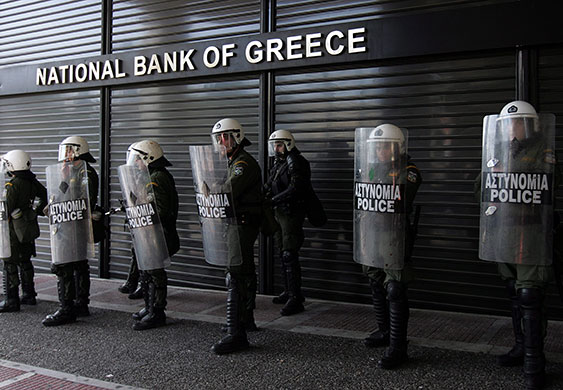
Photo by: underclassrising.net
The Greek government is continuing talks with the European Commission in order to finalise the arrangements and terms of a bailout from the Commission to alleviate some of the pressure on Greece’s finances.
Currently, Greece is indebted to the tune of €330bn; around €30,000 per Greek citizen. Yet Syriza, the governing party of Greece, has refused to cut the public sector pensions of 2.6 million people, or the salaries of 600,000 civil servants. All whilst Summer repayments to the International Monetary Fund and the European Central Bank loom over proceedings.
The sheer amount of debt, and the prolonged discussions, have led many to predict Greece will leave the Eurozone, or even the wider European Union.
To do so would be a disaster, not just for Greece, but for the wider European Union as a whole.

Greece is traditionally a very fiscally liberal, very state-dependent country which has struggled to develop and modernise its industry. Instead of developing an austerity programme to cope with the financial crisis which engulfed the world, the Greek people instead decided to elect a far-Left, statist party completely set against any austerity measures.
Syriza has steadfastly refused to cut public spending. Instead, it has re-employed civil servants made redundant under the last government, and has begged, borrowed and scrounged off of its creditors and its municipalities in order to afford to pay off its debts. Syriza’s policies, and their intransigence in discussions is one of the main causes of Greece’s current ills. Their governance is a luxury Greece cannot afford.
Their election was considered, and has turned out to be, an obscene gesture in the direction of the EU and the creditors. Yet it is only in the European Union where Greece can find solace. Despite the election of Syriza, and despite the lengthy and complex negotiations EU officials have had to endure, the European Commissioners come out of every meeting saying a deal is still possible. Such unity and good grace would not be found elsewhere. As one expert remarked to BBC News, Greece would become to pariah of world markets should it leave the European Union.

Greece’s Prime Minister Alexis Tsipras giving a speech in Bologna, Italy. Photo by: L’Altra Europa con Tsipras
The problems associated with Greece disconnecting itself from the wider European Union go deeper than this superficial level however. Greece’s colossal public infrastructure was built and is maintained by loans and grants during the pre-recession years guaranteed by the economic strongholds of Northern Europe.
Currently, the Union is prepared to continue helping Greece maintain their public sector, without which civil strife would replace law and order and migrants would pour over Greece’s borders into the rest of Europe, much like Libya’s migrants have spilled onto the shores of the Mediterranean to escape the strife in North Africa.
Should Greece leave the EU, their public sector would collapse, leaving nearly a million people unemployed, and plummeting many into poverty. The country would then probably descend into anarchy. Considering Greece’s financial frailty, it is almost unarguable to say that without the European Union, there will be no Greece.
Tags: Alexis Tsipras,
comment,
crisis,
debt,
ECB,
economy,
EU,
Euro,
European Union,
Eurozone,
featured,
Fraser Whieldon,
greece,
IMF,
politics,
sidebar,
syriza
Greece’s finances and the possibility of Grexit
Photo by: underclassrising.net
The Greek government is continuing talks with the European Commission in order to finalise the arrangements and terms of a bailout from the Commission to alleviate some of the pressure on Greece’s finances.
Currently, Greece is indebted to the tune of €330bn; around €30,000 per Greek citizen. Yet Syriza, the governing party of Greece, has refused to cut the public sector pensions of 2.6 million people, or the salaries of 600,000 civil servants. All whilst Summer repayments to the International Monetary Fund and the European Central Bank loom over proceedings.
The sheer amount of debt, and the prolonged discussions, have led many to predict Greece will leave the Eurozone, or even the wider European Union.
To do so would be a disaster, not just for Greece, but for the wider European Union as a whole.
Greece is traditionally a very fiscally liberal, very state-dependent country which has struggled to develop and modernise its industry. Instead of developing an austerity programme to cope with the financial crisis which engulfed the world, the Greek people instead decided to elect a far-Left, statist party completely set against any austerity measures.
Syriza has steadfastly refused to cut public spending. Instead, it has re-employed civil servants made redundant under the last government, and has begged, borrowed and scrounged off of its creditors and its municipalities in order to afford to pay off its debts. Syriza’s policies, and their intransigence in discussions is one of the main causes of Greece’s current ills. Their governance is a luxury Greece cannot afford.
Their election was considered, and has turned out to be, an obscene gesture in the direction of the EU and the creditors. Yet it is only in the European Union where Greece can find solace. Despite the election of Syriza, and despite the lengthy and complex negotiations EU officials have had to endure, the European Commissioners come out of every meeting saying a deal is still possible. Such unity and good grace would not be found elsewhere. As one expert remarked to BBC News, Greece would become to pariah of world markets should it leave the European Union.
Greece’s Prime Minister Alexis Tsipras giving a speech in Bologna, Italy. Photo by: L’Altra Europa con Tsipras
The problems associated with Greece disconnecting itself from the wider European Union go deeper than this superficial level however. Greece’s colossal public infrastructure was built and is maintained by loans and grants during the pre-recession years guaranteed by the economic strongholds of Northern Europe.
Currently, the Union is prepared to continue helping Greece maintain their public sector, without which civil strife would replace law and order and migrants would pour over Greece’s borders into the rest of Europe, much like Libya’s migrants have spilled onto the shores of the Mediterranean to escape the strife in North Africa.
Should Greece leave the EU, their public sector would collapse, leaving nearly a million people unemployed, and plummeting many into poverty. The country would then probably descend into anarchy. Considering Greece’s financial frailty, it is almost unarguable to say that without the European Union, there will be no Greece.